Key takeaways:
- Food waste reflects our habits and can evoke guilt, highlighting the need for mindful meal preparation to reduce waste and utilize every ingredient.
- Effective meal planning and involving family in the meal prep process enhance creativity in cooking, foster a connection with food, and minimize waste.
- Repurposing leftovers creatively transforms potential waste into new meals, emphasizing resourcefulness and sustainability in cooking.
- Choosing quality over quantity and focusing on versatility in ingredients can significantly reduce waste and improve meal flavor and enjoyment.
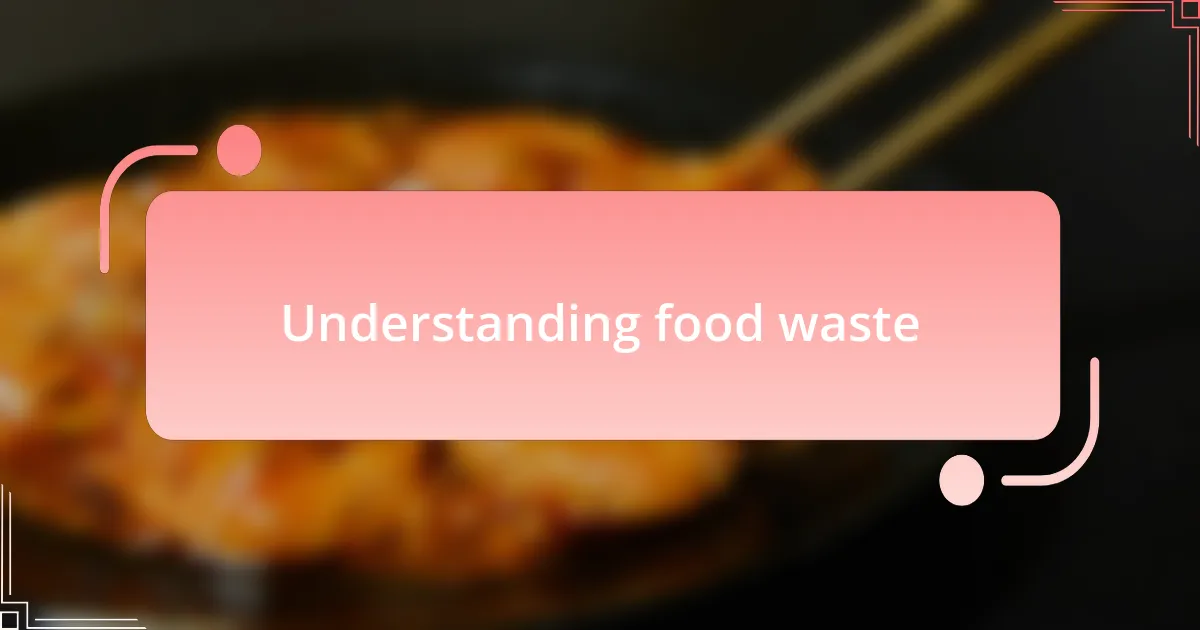
Understanding food waste
Food waste is more than just leftovers tossed in the trash; it reflects our habits, choices, and even our values. I remember a time when my fridge overflowed with produce, and inevitably, some items ended up wilting and going uneaten. It made me question, why do we buy so much only to let it spoil?
There’s an emotional weight to food waste that often goes unnoticed. Each time I toss out spoiled food, I feel a twinge of guilt, knowing it was once a vibrant part of a meal plan or a recipe I was excited to try. Isn’t it frustrating to think about the resources—from water to labor—that go into producing food we never consume?
When we consider food waste on a global scale, staggering statistics come to light; nearly one-third of the food produced for human consumption is wasted. This shines a light on the need for mindfulness and intention in our meal prep. Have you ever thought about the impact your cooking and shopping choices have on the world? Reflecting on this has made me more committed to reducing my own food waste, driving me to find creative ways to use every ingredient I buy.
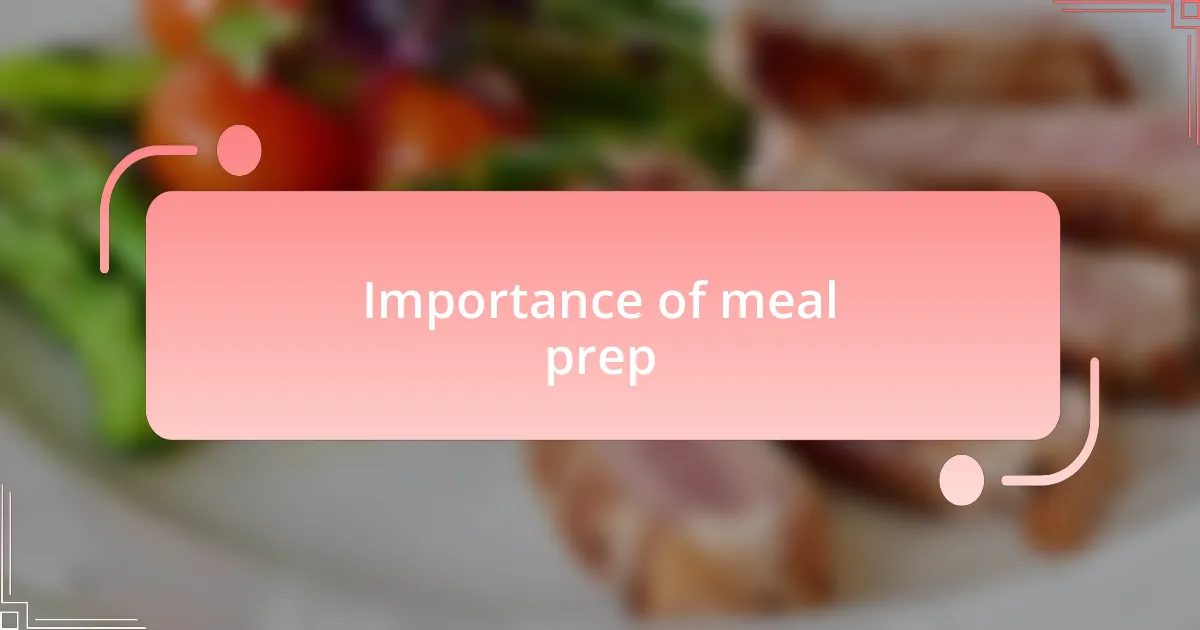
Importance of meal prep
Meal prep has fundamentally changed the way I approach cooking and eating. By planning my meals, I not only save time during busy weekdays but also significantly reduce the amount of food I waste. It’s like having a game plan that helps me utilize every ingredient I buy, transforming potential waste into delicious meals.
In my experience, the importance of meal prep extends beyond convenience; it fosters a deeper connection with my food. When I dedicate time to thoughtfully preparing meals, I’m more mindful of what I’m consuming and how it aligns with my health goals. Have you ever noticed how a well-stocked fridge can inspire creativity in the kitchen? I know that if I have prepped vegetables or grains, I’m far less likely to let them sit untouched until they spoil.
Moreover, meal prep allows me to optimize my grocery shopping by focusing on what I truly need. I recall a time when I used to impulse buy items that looked good at the store, only for them to languish in my pantry. Now, with a clear plan in place, I find myself purchasing only what I’ll actually use, reducing food waste while also saving money. It’s a win-win situation that has transformed my relationship with both food and my budget.
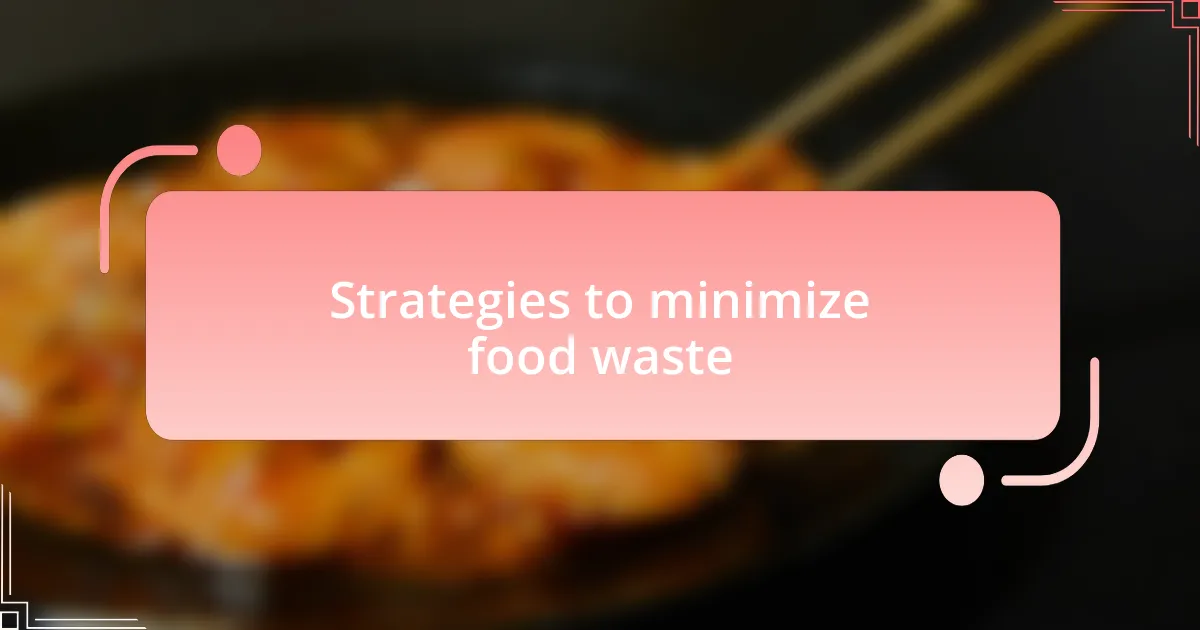
Strategies to minimize food waste
One effective strategy I’ve adopted is incorporating leftovers into my meal plan. Instead of seeing them as a burden, I view them as an opportunity. For instance, if I roast a chicken for dinner, I often save the bones and scraps for a homemade broth. Not only does this minimize waste, but it also enhances the flavor of my next dish, making me feel resourceful and innovative.
I also find that storing food thoughtfully plays a crucial role in reducing spoilage. Investing in good quality storage containers has made a significant difference for me. I remember a time when I used flimsy bags, leading to a surprising amount of wilted greens or shriveled fruits. Now, with airtight containers, my food stays fresher longer, and I can easily see what I have on hand, reducing the chance of forgetting about ingredients altogether.
Finally, I try to involve my family in the meal prep process. Sharing the responsibility not only makes it more enjoyable but also sparks conversations around food and waste. Have you ever noticed how kids are more likely to eat what they’ve helped create? When they contribute to choosing recipes or preparing the ingredients, they feel a sense of ownership that inspires them to appreciate every bite rather than leaving it on the plate. This communal approach is powerful; it fosters awareness and respect for food, ultimately leading to less waste in our household.
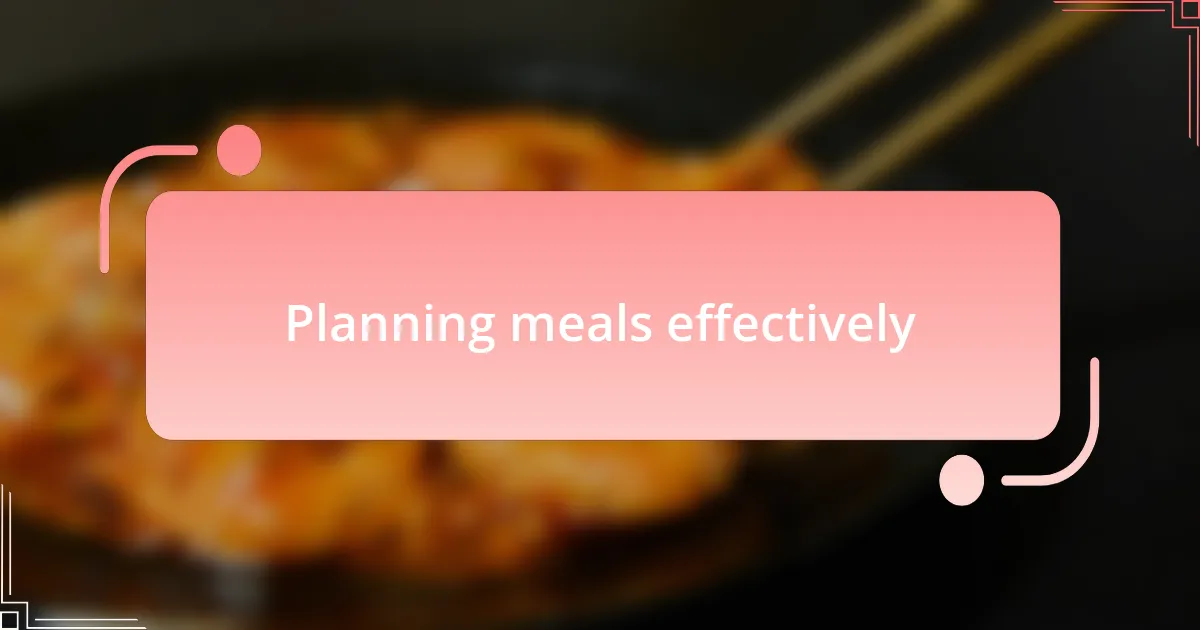
Planning meals effectively
Planning meals effectively is an essential step in my food waste management strategy. I often take a few moments each week to reflect on what I already have in my pantry and fridge. It surprises me how many delicious dishes I can create just by being intentional about the ingredients that are already on hand. Have you ever found a half-empty jar of salsa lurking in the back of your fridge? By planning around those forgotten items, I not only save money but also give new life to ingredients that might otherwise go to waste.
Creating a flexible meal plan is another technique I embrace. While I like to have a rough outline of meals for the week, I allow room for spontaneity. I remember one week when I had planned taco night but then stumbled upon some fresh eggplant in the market. On a whim, I decided to swap out the traditional meat for a roasted eggplant filling. The result was a delightful surprise that not only satisfied dinner cravings but also meant I used up what could have been a wasted vegetable. This adaptability keeps my meals fun and flavorful while minimizing ingredients going to waste.
I find that involving my family in the meal planning process makes a significant difference too. This past Sunday, we gathered around the table to brainstorm meals for the week. As they shared their favorite dishes, I could see their excitement grow; this is an aspect I wholeheartedly enjoy. When each member feels their preferences matter, it creates an environment where they are more likely to eat what we’ve prepared together. Have you ever noticed how a little participation can ignite interest? That connection transforms our meals into something much more meaningful, with less food left uneaten.
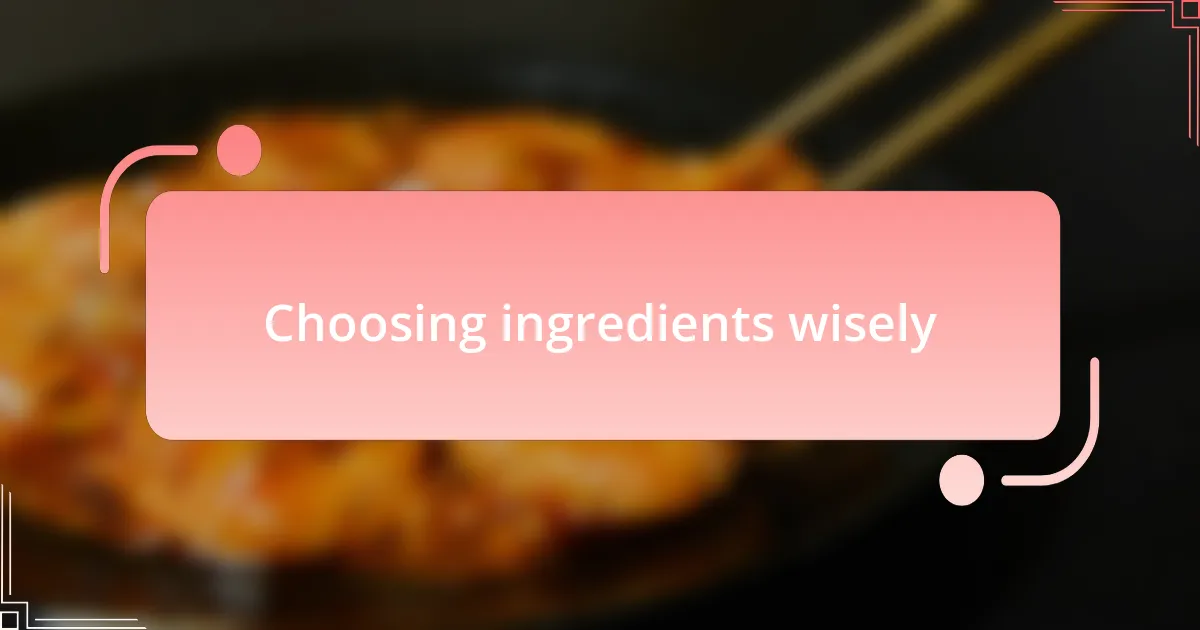
Choosing ingredients wisely
When selecting ingredients, I’ve learned that quality often trumps quantity. I used to think it was wise to stock up on every sale item, but that led to overbuying and eventually waste. Have you ever found yourself with a pile of produce that spoils before you can use it? Now, I focus on purchasing fewer, high-quality items seasonally, which not only reduces waste but also enhances the flavor of my meals.
My experiences at local farmers’ markets have significantly shaped my ingredient choices. There’s something magical about vibrant, fresh produce specifically grown nearby. I remember picking up a basket of ripe tomatoes and being mesmerized by their scent. It inspired a hearty soup that week, and knowing I supported local farmers made the meal even better. This connection to my food makes choosing ingredients more meaningful, and it feels great to reduce the environmental impact of my choices.
I also emphasize versatility when I shop. For example, I recently picked up a bunch of kale, knowing it could be a salad, a smoothie, or even a stir-fry. Each time I consider how many ways I can use an ingredient, it sparks creativity in my cooking. How often do you think about repurposing food in different meals? This mindset has not only minimized waste but turned my cooking into a more exciting adventure.
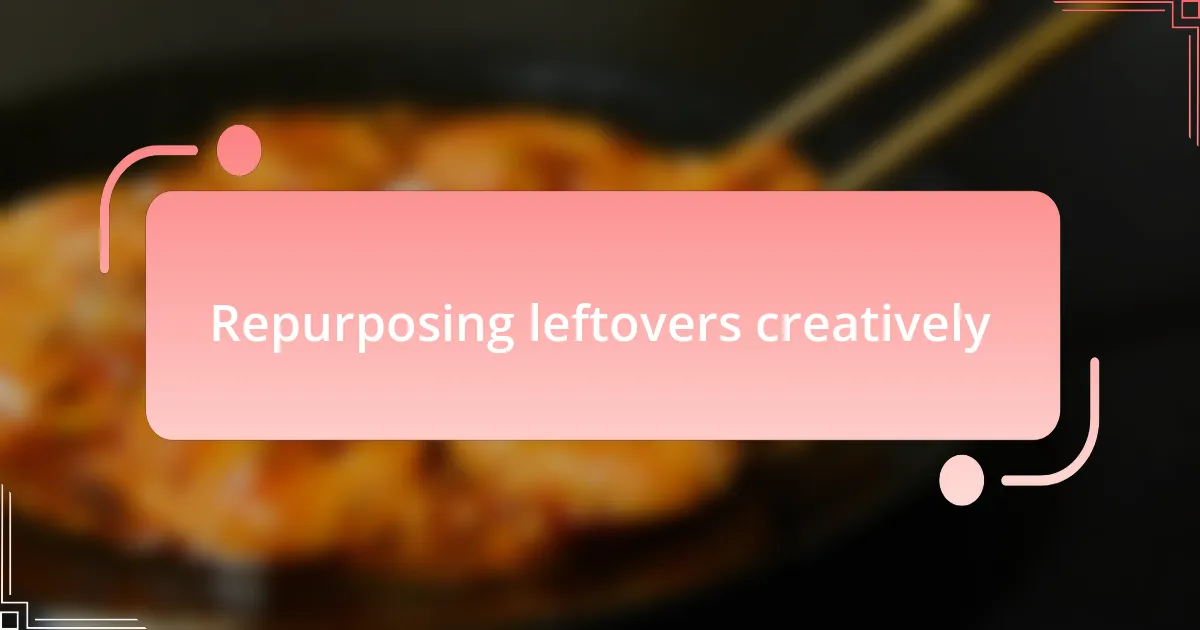
Repurposing leftovers creatively
Repurposing leftovers is one of my favorite aspects of meal prep, as it turns what could be waste into something new and delicious. For instance, last week I had some roasted chicken that didn’t get eaten. Instead of letting it sit in the fridge, I shredded it and tossed it into a savory chicken fried rice. That simple transformation not only elevated my dish but also warmed my heart knowing I was minimizing waste in my own little way.
Sometimes, I find myself with a random assortment of vegetables nearing their expiration date. Rather than tossing them, I create a vibrant vegetable frittata. It’s a playful experience to crack a few eggs and watch those leftover veggies come back to life with fresh herbs and spices. Have you ever noticed how a dish can come together just by being a little creative? It’s like solving a delicious puzzle that’s both satisfying and resourceful.
One particularly memorable creation was a leftover pasta bake I crafted during a busy week. I grabbed some uneaten pasta, a handful of veggies, and a sprinkle of cheese I had on hand. As it baked, the kitchen filled with mouthwatering aromas that made everyone eager to dig in. The joy of turning leftovers into something everyone loved was a delightful reminder of how creativity can breathe new life into our meals and reduce waste significantly.
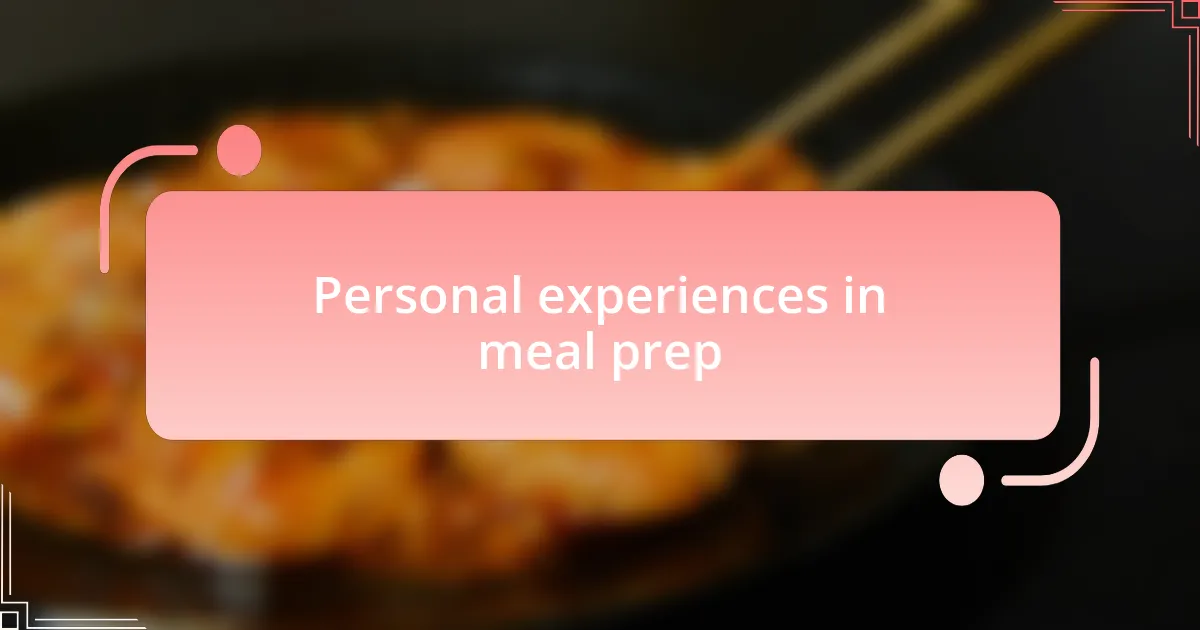
Personal experiences in meal prep
When I first started meal prepping, I struggled with how much food I was actually wasting. There was that one time when I made a large batch of quinoa and ended up with more than I could use. Rather than letting it spoil, I mixed it into a hearty soup the next day, along with whatever odds and ends I had in the fridge. It felt incredible to see everything come together, and honestly, it sparked a sense of pride in my ability to minimize waste.
I remember an evening I was feeling particularly creative, so I decided to turn some aging bread into croutons instead of throwing it away. It was surprising how a simple act of cubing, seasoning, and roasting could transform something stale into a crunchy topping that added texture to my salads all week. Have you ever had that moment where something you thought was finished becomes the star of another dish? It’s those little successes that keep me motivated in my meal prep journey.
Recently, I faced a dilemma with a surplus of sweet potatoes. Instead of letting them languish on the countertop, I decided to whip up a sweet potato and black bean chili. The combination was not only satisfying but also gave me that nostalgic feeling of comfort food wrapped in sustainability. Each spoonful served as a reminder of how resourcefulness in meal prep can also nourish my spirit and the planet.